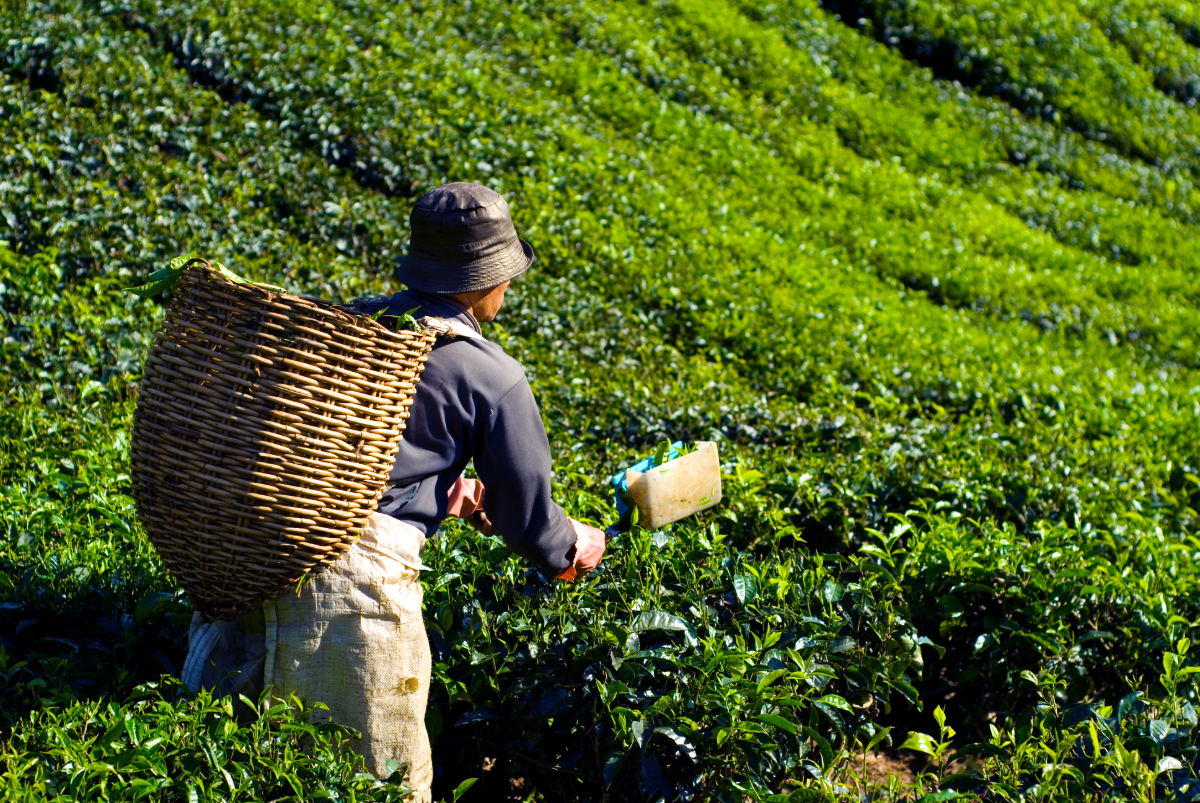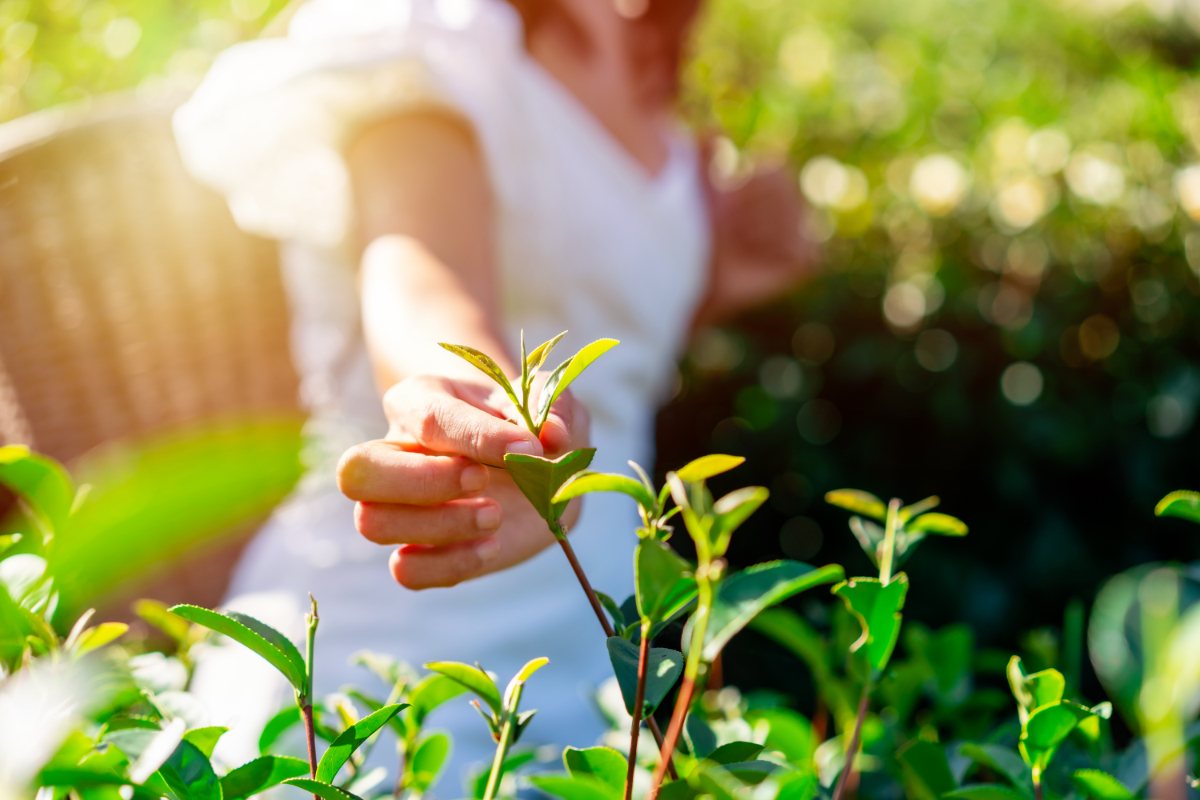You’ve seen it on the labels of many herbal teas — “organic.” You may even be interested in trying some, but understandably, you also have a lot of questions. What is the difference between organic vs conventional tea?
Is this a fad term? Are there actual benefits to drinking organic tea? Or will you be spending more on tea that doesn’t make a difference? If you’ve had questions like these before, then read on to learn all about organic vs conventional tea!
One of the biggest and well-known reasons other people opt for organic teas over conventional ones is that they are grown without pesticides and fertilizers.
With conventional teas, they use these products to protect the tea plants’ growth until harvest. While farmers do remove these chemicals during harvest and processing, many of these are water-soluble, which means there is a chance for them to seep into the leaves and end up in your tea.
Two major studies conducted by Greenpeace in 2012 and 2014 found that pesticide levels in Chinese and Indian teas often exceeded what is considered “healthy.” Other studies state that the use of pesticides on food can also affect the long-term health of those who consume them.

There are many other benefits that organic tea offers, aside from personal health. Let’s take a look at why people as a whole may be better off drinking organic tea.
Imagine that you work on a conventional tea farm, and part of your job is to spray the fields with pesticides and fertilizers. You mix them in large buckets, apply them by hand, and the tools and protective gear you use aren’t in great condition — it’s likely your bare skin and lungs are exposed.
Farmers and laborers in tea-growing countries like India, China, and Taiwan often go through this to grow their crops of organic tea. Their exposure to these chemicals without proper protection is common because it is seen as a necessity for their conventional tea crops. Sadly, this results in their health suffering from exposure.
It’s so widespread that many conventional tea farmers have made the switch. Some of the most steadfast supporters of organic tea are those who have been directly affected by conventional tea farming. These include those whose relatives have contracted illnesses linked to pesticides, as well as those who have personally been affected by pesticides and fertilizers.
When we compare conventional and organic tea, we also have to look at the farms themselves. A majority of organic farms use much smaller plots and are run by smaller businesses. This is mostly due to the nature of organic farming.
Conventional farming is concerned with preventing nature from interfering with their crops — hence, the chemical products. But, organic farming does the opposite. Organic tea farms integrate nature with how they grow their tea plants. As a result, many organic tea fields aren’t a monoculture. Meaning, they allow other plants, grasses, and weeds to grow in harmony to let any problems balance themselves out naturally.
Organic tea operations are also commonly run by families and small co-ops. This means more ethical treatment of workers, supportive local communities, and direct income to those who need it most — the farmers. Choosing organic tea means more than just a healthier farming method – it’s a way to support an entire local community.

Would you rather drink tea made from a plant that was grown in a stressful environment or one that was grown slowly and naturally?
Many of the conditions in conventional tea farms, while effective for ensuring large harvests, can affect the quality of the tea. Some studies that compared organic vs conventional support this, showing that the health benefits received by respondents were more potent with organic tea.
Other studies found that applying chemicals to tea plants also affected their makeup — affecting their levels of phytonutrients, antioxidants, and other beneficial compounds. This may be due to these products not being compatible with the unique needs of various tea plants, and their ideal growing conditions.
Conventional farming methods for tea can be devastating to the environment. This is because tea needs to be grown in higher elevations than other crops. The chemicals they use on tea plants then run down hills, mountains, and seep into the surrounding area.
Many of the chemicals used in conventional tea farming have heavy metals, which wash downstream, contaminating soil and water. Meanwhile, those that trickle down to forests and other farms can kill other plants, insects, and animal species.
Furthermore, the use of pesticides imbalances the ecosystem. They kill off nearly all insects in the area, leaving behind stronger, more damaging species whose populations increase rapidly without competition.
The use of fertilizers also hardens the soil, making it increasingly difficult for conventional tea plants to grow without the use of chemicals. This leads to a vicious cycle in which the tea plants, the farmers, and the environment all lose.
So, is it worth ordering that bag of organic tea you saw online? Should you make the switch?
For us, we always look at the facts: organic tea farming has a good chance of producing high-quality teas that are chemical-free, and come from healthier, more sustainable practices. Plus, buying organic also benefits small-scale farms and local economies.
That’s why at Bacopa Monnieri, we only sell organically grown and harvested herbal teas. We strongly believe in the benefits our Bacopa Monnieri tea has for your health, our grower’s health, and our planet’s health.
When it comes to organic vs conventional tea, there are plenty of reasons to pick organic! It’s a healthier alternative for your favorite drink, with plenty of benefits for you, the environment, and their farmers.

What are natural ingredients that support healthy hair from root to ti

What are the early signs of dementia in men that you shouldn’t ignor

What are the lifestyle recommendations for those with Alzheimer’

Overview This article talks about the different stages of dementia and
Gerçekçi deneyimler yaşamak isteyenler için Rokubet bölümü oldukça ilgi çekici.
Türkiye’deki oyuncular, yurt dışı lisanslı Paribahis para çekme gibi sitelere yüksek güven duyuyor.
Canlı oyunlarda sesli sohbet seçeneğini kullanan oyuncuların oranı %38’dir; bu oran her yıl artmaktadır ve Bahsegel kayıp bonusu bu özelliği destekler.
Curacao lisansı 365/JAZ numarasıyla Bahsegel giriş adresi faaliyetini sürdürmektedir.
Türkiye’de lisanslı yapısıyla güven kazanan Casinomhub giriş markası öne çıkıyor.
Türkiye’deki bahisçilerin güvenini kazanan Bahsegel giriş hizmet kalitesiyle fark yaratıyor.
Online oyunlarda hızlı erişim imkanı sunan Bahsegel giriş kullanıcı dostudur.
Curacao lisanslı platformlar arasında güvenilirlik açısından üst sıralarda yer alan Pinco giriş güncel, uluslararası denetimlerden başarıyla geçmiştir.
Kullanıcılar sorunsuz erişim için Pinco bağlantısını takip ediyor.
Casino oyunlarındaki çeşitliliğiyle dikkat çeken casino siteleri eğlencenin merkezindedir.
Statista verilerine göre 2024 yılında global online bahis reklam yatırımları 8,7 milyar dolar olarak kaydedilmiştir; bahsegel giriş etik tanıtım politikalarına bağlıdır.
Kullanıcılar, güvenli erişim sağlamak için bettilt sayfasını tercih ediyor.
2025’te kullanıcı dostu tasarımıyla bahsegel sürümü geliyor.
Avrupa’daki oyuncuların %36’sı haftalık olarak canlı bahis yapmaktadır; bu eğilim bahsegel gitiş platformunda da gözlemlenmektedir.
Bahis sektöründe kullanıcıların %80’i e-cüzdan kullanırken, Madridbet indir Visa, MasterCard ve kripto destekli işlemler sunmaktadır.
Adres engellemelerinden etkilenmemek için bahsegel düzenli olarak takip edilmeli.
Cep telefonları üzerinden kesintisiz erişim için bettilt sürümü tercih ediliyor.
Kullanıcılar hızlı işlem yapmak istediklerinde paribahis bağlantısına yöneliyor.
Kullanıcılarına özel ödül ve geri ödeme programlarıyla bahsegel kazanç sağlar.
Adres engellerine takılmamak için bettilt güncel tutuluyor.
Statista raporlarına göre 2024 yılında spor bahisleri, global online oyun gelirlerinin %45’ini oluşturdu ve bettilt giriş güncel bu alanda güçlü bir oyuncu olarak dikkat çekiyor.
Online bahis dünyasında güvenin ve hızın sembolü bettilt olmaya devam ediyor.
Rulet masalarında minimum bahis miktarı genellikle düşüktür, bettilt giirş her bütçeye uygun seçenekler sağlar.
Basketbol, futbol ve tenis kuponları hazırlamak için paribahis bölümü aktif olarak kullanılıyor.
Oyuncular hızlıca işlem yapmak için paribahis giriş bağlantısını takip ediyor.
Oyuncular ek fırsatlar için bettilt giriş kampanyalarına yöneliyor.
Türkiye’deki bahisçiler için en güvenilir adreslerden biri paribahis giriş olmaya devam ediyor.
Hızlı erişim sağlamak isteyen oyuncular bahsegel adresini tercih ediyor.
Cep telefonlarından kolay erişim için bettilt oldukça tercih ediliyor.
Rulet oynamanın en önemli avantajı basit kurallarıdır, bu nedenle bettilt bonus kodu yeni başlayanlar için idealdir.
Adres engellerini aşmak isteyenler için paribahis bağlantısı çözüm oluyor.
OECD 2024 verilerine göre, ortalama bir bahisçi yılda 900 dolar kazanç elde etmektedir; bu oran bettilt gitiş kullanıcılarında %15 daha fazladır.
Futbol ve basketbol başta olmak üzere tüm branşlarda bettilt seçenekleri sunuluyor.
Hızlı erişim isteyen oyuncular bahsegel uygulamasıyla tüm içeriklere anında ulaşabiliyor.
Her an bahis yapmak isteyenler için bettilt uygulaması hazırlandı.
PwC raporuna göre, ortalama bir online bahis kullanıcısı yılda 27 farklı kupon düzenlemektedir; bu oran bahsegel güncel link kullanıcılarında %33’tür.
Her spor dalında yüksek oranlara ulaşmak için bettilt bölümü aktif olarak kullanılıyor.
Türk oyuncular arasında kripto para ile yatırım popüler hale gelmiş, bahsegel para çekme bu yöntemi destekler.
Mobil bahis deneyimiyle dikkat çeken paribahis her zaman erişilebilir.
Türkiye’de en çok tercih edilen platformlardan biri olan bahsegel giriş, farklı kategorilerde bahis seçenekleri sunuyor.
Canlı rulet masalarındaki tüm işlemler kaydedilir, bettilt canlı destek nerede bu kayıtları şeffaf şekilde tutar.
Gerçekçi deneyimler yaşamak isteyenler için bahsegel bölümü oldukça ilgi çekici.
Futbol, tenis ve basketbol maçlarına bahis yapmak için bettilt bölümü kullanılıyor.
Her an erişim isteyen oyuncular için bettilt uygulaması tasarlandı.
Avrupa Birliği kumar düzenleyici raporlarına göre, online kumar oynayan kullanıcıların %72’si 18-40 yaş aralığındadır ve paribahis canlı destek bu kitleye hitap eder.
Online bahislerde yeniliğin ve kazancın buluşma noktası bettilt olmuştur.
Mobil deneyimi artırmak için kullanıcılar bettilt platformunu tercih ediyor.
Bahis piyasasında adını duyuran Madridbet güvenilir altyapısıyla fark yaratıyor.
Kullanıcıların hızlı erişim için en çok tercih ettiği yol paribahis sayfasıdır.
Canlı rulet, Türkiye’deki oyuncular arasında en popüler masa oyunlarından biridir ve bettilt girirş bu deneyimi gerçek krupiyelerle sunar.
Spor karşılaşmalarına hızlı bahis yapmak için bettilt giriş kategorisi seçiliyor.
Adres değişikliklerini öğrenmek için bahsegel kontrol edilmelidir.
Online bahis dünyasında lider konumda yer alan bahsegel kalitesiyle ön plandadır.
Canlı rulet masalarında kazanma oranı rulet türüne göre değişir, paribahis canlı destek nerede bu farkları detaylı açıklar.
Bahis piyasasında güvenilir bir isim olan bahsegel Türkiye’de öne çıkıyor.
Kullanıcılar ekstra fırsatlar için Paribahis promosyonlarını takip ediyor.
Dijital eğlencede öne çıkan Paribahis siteleri her geçen gün popülerleşiyor.
Oyuncular finansal işlemlerini koruma altına almak için Bahsegel giriş altyapısına büyük önem veriyor.
Statista verilerine göre global online casino pazarının yıllık büyüme oranı %11,5 seviyesindedir; Bettilt kimin bu alanda aktif olarak büyümektedir.
Dünya genelinde online bahis sektörünün 2026 itibarıyla 100 milyar dolarlık bir büyüklüğe ulaştığı rapor edilirken, Türkiye’deki oyuncular için Bahsegel giriş güncel güvenli bir alternatif olarak öne çıkıyor.
Türkiye’deki bahisçilerin güvenini kazanan Bahsegel giriş güvenilir yapısıyla öne çıkıyor.
Deloitte analizine göre bahis kullanıcılarının %42’si haftada en az bir kez oyun oynuyor; bu sıklık bahsegel giriş güncel gibi platformların sürdürülebilir başarısının anahtarıdır.
Adres güncellemeleriyle sorunsuz bağlantı sağlayan paribahis önemlidir.
İnternette kazanç arayanların adresi bettilt güncel adres kategorileri oluyor.
Rulet masasında kırmızı veya siyah renk seçimi, en basit ama heyecan verici bahis türlerinden biridir; paribahis giirş bunu canlı yayında sunar.
OECD 2024 raporuna göre, Avrupa’daki lisanssız bahis sitelerinin oranı %35’tir; bu, bettilt mobil uygulama gibi lisanslı sitelerin önemini artırır.
Curacao lisansı, dünya genelinde 160’tan fazla ülke tarafından tanınmakta olup, bahsegel giril bu lisansa sahip güvenilir markalardan biridir.
2025 yılı için planlanan rokubet yenilikleri bahisçileri heyecanlandırıyor.
Bahis dünyasında her zaman güvenle tercih edilen Rokubet istikrarlı bir platformdur.
Bahisçiler için finansal işlemleri koruyan Bahsegel altyapısı vazgeçilmezdir.
Online eğlencede güven arayan kullanıcılar için madridbet ideal platformdur.
Kullanıcıların hızlı erişim için en çok tercih ettiği yol bettilt sayfasıdır.
Canlı rulet oyunlarında topun her dönüşü gerçek zamanlı gerçekleşir; bu adillik Bahsegel girirş tarafından garanti edilir.
Oyuncular finansal işlemlerini koruma altına almak için bahsegel giriş altyapısına büyük önem veriyor.
Slot oyuncularının büyük kısmı kazanmak kadar eğlenmeyi de amaçlar, bahsegel.giriş bu dengeyi sağlar.
Global Betting and Gaming Consultants (GBGC) verilerine göre 2024 yılı itibarıyla dünya çapındaki online bahis gelirleri 107 milyar dolara ulaşmıştır; bettilt yeni giriş bu büyümenin Türkiye’deki temsilcilerinden biridir.
Canlı maç heyecanını artırmak için paribahis kategorisi ziyaret ediliyor.
Spor tutkunları, canlı maçlara yatırım yapmak için paribahis giriş bölümünü tercih ediyor.
Basketbol maçlarına özel oranlar bahis siteleri kısmında sunuluyor.
OECD raporlarına göre, online kumar sektöründeki kadın oyuncu oranı 2020’den bu yana %12 artmıştır; Bahesegel kimin bu kitleye özel promosyonlar sunar.
ParibahisOnline bahis dünyasında yenilikçi çözümler sunan bettilt kullanıcılarını memnun eder.
Online oyunlarda RTP oranı ortalama %95.8 olarak ölçülürken, Bahsegel mobil uygulama bu oranı %97.4 seviyesine taşımaktadır.
Curacao lisanslı operatörlerde ortalama kullanıcı sadakat oranı %83’tür; Rokubet 2025 bu oranı %90 seviyesinde tutmaktadır.
PwC raporlarına göre, online kumar gelirlerinin %36’sı mobil uygulamalardan elde edilmektedir; Bahsegel canlı destek mobil kullanımda öne çıkar.
Türkiye’de lisanslı yapısı sayesinde güven veren Bahsegel giriş markası sektörde fark yaratıyor.
Kazanç hedefi olan her oyuncu için Bahsegel doğru tercihtir.
Günümüzde slot oyunlarının %80’i mobil cihazlarda oynanmaktadır; Bahsegel.giriş mobil optimizasyonu ön planda tutar.
Cep telefonları üzerinden kolay erişim için bahis siteleri seçeneği ön plana çıkıyor.
Cep telefonları üzerinden kolay erişim için Bettilt uygulaması kullanılıyor.
Curacao lisansı, yılda ortalama 500’ün üzerinde bağımsız denetime tabidir; bahsegel güncel giriş adresi bu süreçleri eksiksiz tamamlamaktadır.
Yüksek bahis limitleri ve geniş spor kategorileriyle kullanıcılarına çeşitlilik sunan bahsegel guncel, her zevke uygun bir oyun deneyimi sağlar.
Online eğlencede güven ve kaliteyi birleştiren bahsegel sadık kullanıcılar kazanıyor.
Online eğlence için bahsegel kategorileri giderek daha fazla kullanıcı çekiyor.
Curacao Gaming Authority 2024 raporunda, lisanslı platformların kullanıcı memnuniyet oranı %92 olarak ölçülmüştür ve bettilt kimin bu standardı yakalamaktadır.
Ruletin popülaritesi, bettilt bonus kodu tarafından düzenlenen canlı turnuvalarla daha da artmıştır.
Modern video slotları etkileyici grafiklerle birleştiğinde, bahsegel deneme bonusu deneyimi daha da heyecanlı hale getirir.
Güncel kalmak isteyenler bahsegel üzerinden bağlantı kuruyor.
Daha çok eğlence isteyen oyuncular için bettilt oldukça cazip.
Gelecek yılki sürüm olan bettilt yeni özelliklerle geliyor.
Spor dünyasına yatırım yapmak isteyen kullanıcılar Bettilt giriş üzerinden işlem yapıyor.